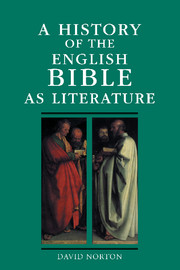Book contents
- Frontmatter
- Contents
- List of plates
- Preface
- List of abbreviations
- 1 Creators of English
- 2 From the Great Bible to the Rheims-Douai Bible: arguments about language
- 3 The King James Bible
- 4 Literary implications of Bible presentation
- 5 The struggle for acceptance
- 6 The Psalter in verse and poetry
- 7 ‘The eloquentest books in the world’
- 8 Writers and the Bible 1: Milton and Bunyan
- 9 The early eighteenth century and the King James Bible
- 10 Mid-century
- 11 The critical rise of the King James Bible
- 12 Writers and the Bible 2: the Romantics
- 13 Literary discussion to mid-Victorian times
- 14 The Revised Version
- 15 ‘The Bible as literature’
- 16 The later reputation of the King James Bible
- 17 The New English Bible
- Bibliography
- General Index
- Biblical Index
11 - The critical rise of the King James Bible
Published online by Cambridge University Press: 05 June 2012
- Frontmatter
- Contents
- List of plates
- Preface
- List of abbreviations
- 1 Creators of English
- 2 From the Great Bible to the Rheims-Douai Bible: arguments about language
- 3 The King James Bible
- 4 Literary implications of Bible presentation
- 5 The struggle for acceptance
- 6 The Psalter in verse and poetry
- 7 ‘The eloquentest books in the world’
- 8 Writers and the Bible 1: Milton and Bunyan
- 9 The early eighteenth century and the King James Bible
- 10 Mid-century
- 11 The critical rise of the King James Bible
- 12 Writers and the Bible 2: the Romantics
- 13 Literary discussion to mid-Victorian times
- 14 The Revised Version
- 15 ‘The Bible as literature’
- 16 The later reputation of the King James Bible
- 17 The New English Bible
- Bibliography
- General Index
- Biblical Index
Summary
THE INFLUENCE OF POPULAR FEELING
What we have just seen from The Critical Review is a reminder of just how important popular feeling was in shaping critical opinion. Ever since Tyndale set out to give the Bible to the ploughboy, there had been an association between the English Bible and the ill-educated: literacy and Bible-reading went hand in hand, as in the stories of William Maldon or of Defoe's Somerset schoolboy (see above, pp. 10 and 214). The kind of simple love and faith such as Bishop Patrick's maid had shown for the singing Psalms (see above, p. 124) were common responses to the Bible. One Josiah Langdale, born in 1673, recalls that ‘I had not time for much schooling … yet I made a little progress in Latin, but soon forgot it; I endeavoured, however, to keep my English, and could read the Bible and delighted therein.’ Such comments have a representative value, as does this recollection of the ‘domestic interiors of the husbandmen or farmers’ in the Lothians in the 1760s: ‘no book was so familiar to them as the Scriptures; they could almost tell the place of any particular passage, where situated in their own family Bible, without referring to either book, chapter or verse; and where any similar one was situated’.
From the 1760s on such intense and widespread feeling and familiarity among the less educated played an important role in the rise of admiration for the KJB among the intelligentsia. In spite of their wider reading and their education in Augustan standards, they were catching up with the people.
- Type
- Chapter
- Information
- A History of the English Bible as Literature , pp. 242 - 271Publisher: Cambridge University PressPrint publication year: 2000



